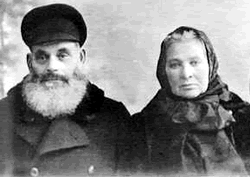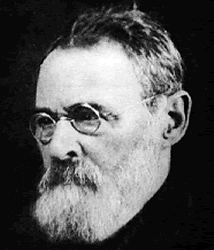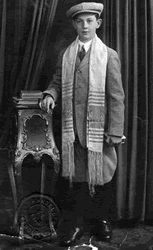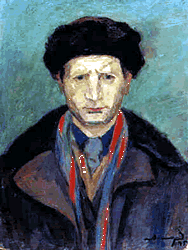City Vilna
#axl-2:
Pavel Axelrod ( 1850- 1928) read story #axl-3
#axl-3:
Julius Axelrod on his Bar Mitzvah 1925, New York City. read story
of Dr. Axelrod below.
The Axelrod family of Dunilovitz
Rabbi Yitzhak was born c 1845. He was the rabbi of Dunilovitz c 1870.
In the book "Yahadut Lita" volume 3 page 112-113 there is a story
about his two revolutionary daughters.
Axelrod Lyuba was born in 1868 in Dunilovitz . Already at age 15 she
left her family in Dunilovitz to Vilna. There she joined under ground
organizations and moved to Poltachova, Kharkov and Malitopol in the
Ukraine.
After the assassination of the Russian czar Alexander in 1889, she
moved with her friend; Ch. Rapoport, first to Paris and then to
Switzerland. Studied in the university of Bern were she received a
Ph.D. (Philosophy. ) She was politically involved with the underground
S.D and later S.R.
After the revolt of 1905 she returned to Russia and wrote for some
socialist newspapers. She was a member of the professional union in
St. Petersburg. She lectured in centers for unionized laborers. In
1915 she was punished and sent to Siberia together with all the
members of the Russian paper " our concern'.
In 1917 she was an editing member of the Russian papers "Unity".
After the first revelation in 1917 she was a member of the central S.D
and the temporary parliament
After the Bolshevik revolution of October (1917), she retired from
political activities.
She lived in Tambov 1918- 1920 and in 1921 headed a philosophy
department in the institution of "Red professorship".
Her bibliography (all in Russian);
"Philosophical dissertation" 1906
"In opposition to Idealism" 1922
"Criticism of the capitalist society and historical materialism" 1925
L. Tolstoy and the S. D."
Axelrod Ida was born in Dunilovitz in 1870. She followed her sister
and already at age 17 was a member of a revolutionary cell and
imprisoned. In 1893 she joined her sister in Switzerland She studied
in the university and received a pH. D. in Philosophy.
She was a member of the movement 'free the laborers' and "Eeiskara".
In 1903 She joined the Bolsheviks. After some time she transferred
together with Georgi Plekhanov
1856 – 1918 the Mensheviks. During the First World War she was a
member of the group that signed the pamphlet "'To the nation of
workers in Russia" (1915).
Took part in the collection by Plekhanov "War".
http://www.nlr.ru:8101/eng/nlr/housePleh/p1.htm
Returned to Russia before the October, 1917 overthrow. Wrote revues of
Marxist literatures.
(I do not know if Axelrod was the original name of the sisters; on the
Internet I found information about another Axelrod who might be
somehow related)
http://www.spartacus.schoolnet.co.uk/RUSaxelrod.htm
Pavel Axelrod was born in Chernigov, Russia, in 1850. Deeply
influenced by the writings of Mikhail Bakunin, he established a
socialist group of students in Kiev. He also contributed to the
radical journals, Worker and Commune.
In 1877 he joined the Land and Liberty. Three years later the group
split into two factions. The majority of members, who favoured a
policy of terrorism, established the People's Will. Axelrod and George
Plekhanov established the Black Repartition group that rejected
terrorism and supported a socialist propaganda campaign among workers
and peasants.
Axelrod went with George Plekhanov to live in Switzerland and in 1883
they established the Liberation of Labour group.
In March, 1898, the various Marxist groups in Russia met in Minsk and
decided to form the Social Democratic Labour Party (SDLP). The party
was banned in Russia so most of its leaders were forced to live in
exile. Axelrod became co-editor of a journal called Iskra. It was
printed in several European cities and then smuggled into Russia by a
network of SDLP agents.
At the Second Congress of the Social Democratic Labour Party in London
in 1903, there was a dispute between Vladimir Lenin and Julius Martov,
two of SDLP's leaders. Lenin argued for a small party of professional
revolutionaries with a large fringe of non-party sympathizers and
supporters. Martov disagreed believing it was better to have a large
party of activists.
Julius Martov based his ideas on the socialist parties that existed in
other European countries such as the British Labour Party. Lenin
argued that the situation was different in Russia as it was illegal to
form socialist political parties under the Tsar's autocratic
government. At the end of the debate Martov won the vote 28-23 .
Vladimir Lenin was unwilling to accept the result and formed a faction
known as the Bolsheviks. Those who remained loyal to Martov became
known as Mensheviks.
Along with Julius Martov, Pavel Axelrod, Leon Trotsky, Irakli
Tsereteli, Moisei Uritsky, Noi Zhordania and Fedor Dan, Axelrod joined
the Mensheviks. However, a large number of important figures in the
Social Democratic Labour Party, including Gregory Zinoviev, Anatoli
Lunacharsky, Joseph Stalin, Mikhail Lashevich, Nadezhda Krupskaya,
Mikhail Frunze, Alexei Rykov, Yakov Sverdlov, Lev Kamenev, Maxim
Litvinov, Vladimir Antonov, Felix Dzerzhinsky, Gregory Ordzhonikidze
and Alexander Bogdanov joined the Bolsheviks.
An opponent of the First World War, Axelrod worked with Julius Martov,
Vladimir Antonov and Leon Trotsky, to produce the internationalist
newspaper, Our World.
After the February Revolution Axelrod returned to Russia but was too
late to stop some Mensheviks joining the Provisional Government. He
strongly criticized those Mensheviks such as Irakli Tsereteli and
Fedor Dan who now supported the war effort. However at a conference
held on 18th June, 1917, he failed to gain the support of the
delegates for a policy of immediate peace negotiations with the
Central Powers.
After the October Revolution, which Axelrod called a "historical crime
without parallel in modern history", he toured the world rallying
socialist opposition to the Bolsheviks. Pavel Axelrod died in 1928.
Pavel Axelrod ( son of Boris)
http://www.spartacus.schoolnet.co.uk/RUSaxelrod.htm
Pavel Axelrod was born in Chernigov, Russia, in 1850. Deeply
influenced by the writings of Mikhail Bakunin, he established a
socialist group of students in Kiev. He also contributed to the
radical journals, Worker and Commune.
In 1877 he joined the Land and Liberty. Three years later the group
split into two factions. The majority of members, who favoured a
policy of terrorism, established the People's Will. Axelrod and George
Plekhanov established the Black Repartition group that rejected
terrorism and supported a socialist propaganda campaign among workers
and peasants.
Axelrod went with George Plekhanov to live in Switzerland and in 1883
they established the Liberation of Labour group.
In March, 1898, the various Marxist groups in Russia met in Minsk and
decided to form the Social Democratic Labour Party (SDLP). The party
was banned in Russia so most of its leaders were forced to live in
exile. Axelrod became co-editor of a journal called Iskra. It was
printed in several European cities and then smuggled into Russia by a
network of SDLP agents.
At the Second Congress of the Social Democratic Labour Party in London
in 1903, there was a dispute between Vladimir Lenin and Julius Martov,
two of SDLP's leaders. Lenin argued for a small party of professional
revolutionaries with a large fringe of non-party sympathizers and
supporters. Martov disagreed believing it was better to have a large
party of activists.
Julius Martov based his ideas on the socialist parties that existed in
other European countries such as the British Labour Party. Lenin
argued that the situation was different in Russia as it was illegal to
form socialist political parties under the Tsar's autocratic
government. At the end of the debate Martov won the vote 28-23 .
Vladimir Lenin was unwilling to accept the result and formed a faction
known as the Bolsheviks. Those who remained loyal to Martov became
known as Mensheviks.
Along with Julius Martov, Pavel Axelrod, Leon Trotsky, Irakli
Tsereteli, Moisei Uritsky, Noi Zhordania and Fedor Dan, Axelrod joined
the Mensheviks. However, a large number of important figures in the
Social Democratic Labour Party, including Gregory Zinoviev, Anatoli
Lunacharsky, Joseph Stalin, Mikhail Lashevich, Nadezhda Krupskaya,
Mikhail Frunze, Alexei Rykov, Yakov Sverdlov, Lev Kamenev, Maxim
Litvinov, Vladimir Antonov, Felix Dzerzhinsky, Gregory Ordzhonikidze
and Alexander Bogdanov joined the Bolsheviks.
An opponent of the First World War, Axelrod worked with Julius Martov,
Vladimir Antonov and Leon Trotsky, to produce the internationalist
newspaper, Our World.
After the February Revolution Axelrod returned to Russia but was too
late to stop some Mensheviks joining the Provisional Government. He
strongly criticized those Mensheviks such as Irakli Tsereteli and
Fedor Dan who now supported the war effort. However at a conference
held on 18th June, 1917, he failed to gain the support of the
delegates for a policy of immediate peace negotiations with the
Central Powers.
After the October Revolution, which Axelrod called a "historical crime
without parallel in modern history", he toured the world rallying
socialist opposition to the Bolsheviks. Pavel Axelrod died in 1928.
Lyubov Axelrod
For another leading Menshevik with the same last name, see Pavel
Axelrod.
Lyubov Isaakovna Axelrod (born Emther Axelrod, Russian: , 1868 - 1946)
was a Russian revolutionary, Marxist philosopher and an art
theoretician.
Axelrod was born in the family of a rabbi in Vilenkovichi, a village
in the Vilna gubernia of the Russian Empire. She became involved with
the narodnik organization at age 16 and took part in unsuccessful
attempts to assassinate Alexander III of Russia. In 1887 she emigrated
to Switzerland and received her Ph.D. in philosophy from Berne
University in 1900.
In 1892 she became a Marxist and joined the Geneva-based Emancipation
of Labor group, becoming a close associate of its leader Georgi
Plekhanov. When the Russian Social Democratic Labor Party split into
Bolsheviks and Mensheviks at its Second Congress in 1903, she sided
with the Menshevik faction.
In 1906 Axelrod returned to Russia and became a leading Russian
authority on Marxist philosophy, second only to Plekhanov. She was
critical of both Alexander Bogdanov and Vladimir Lenin during their
debate over Empiriocriticism in 1908-1909, branding their ideas
anti-Marxist.
In the 1920s she first worked at the Institute of Red Professors and
later at the Soviet Institute of Philosophy. In the 1930s her version
of Marxism was officially denounced as a Mechanistic revision of
Marxism and she faded into obscurity.
Site devoted to Lyubov Axelrod -in Russian
This entry is from Wikipedia, the leading user-contributed
encyclopedia.
---------------
Julius Axelrod – Biography
Julius Axelrod was born on May 30th, 1912, in New York City. He
obtained his B. Sc. in 1933 at the College of the City of New York, M.
A. in 1941 at New York University, and Ph. D. in 1955 from the George
Washington University.
From 1933 to 1935 he was Laboratory Assistant at the Department of
Bacteriology of New York University Medical School; from 1935-1946 he
was Chemist at the Laboratory of Industrial Hygiene; 1946-1949,
Research Associate, Third New York University Research Division,
Goldwater Memorial Hospital; 1949-1950, Associate Chemist, Section on
Chemical Pharmacology, National Heart Institute, NIH; 1950-1953,
Chemist, National Heart Institute, NIH, where he became Senior Chemist
in 1953, and was appointed Chief of the Section on Pharmacology,
Laboratory of Clinical Science, National Institute of Mental Health,
Health Services and Mental Health Administration, Department of
Health, Education and Welfare in 1955.
The following honors and awards were granted to Dr. Axelrod: National
Science Foundation Travel Award, 1958; Corresponding Member of the
German Pharmacological Society, 1959; International Physiological
Union Travel Award, 1961; Otto Loewi Memorial Lecture, New York University Medical School, 1964; Distinguished Research Award, Assoc.
Res. Nerv. Mental Diseases, 1965; Karl E. Paschkis Memorial Lecture,
Philadelphia Endocrine Society, 1966; Honorary Sc.D., University of
Chicago, 1966; The Gairdner Foundation Award, 1967; National
Institutes of Health Lecture, 1967; Nathanson Memorial Lecture,
University of Southern California, 1968; Distinguished Achievement
Award, George Washington University, 1968; Superior Service Award,
DHEW, 1968; Claude Bernard Professorship, University of Montreal,
1969; Distinguished Service Award, DHEW, 1970; Distinguished Service
Award, Modern Medicine Magazine, 1970.
Dr. Axelrod is a Member of Sigma Xi, International Brain Research
Organization, American Chemical Society, American Society of
Pharmacology and Experimental Therapeutics, American Society of
Biological Chemists, American Association for the Advancement of
Science, and a Fellow of the American College of
Neuropsychopharmacology, 1961 (Member of the Council, 1966-1969).
Dr. Axelrod is a Member of the editorial boards and committees of a
number of journals, among which: Journal of Pharmacology and
Experimental Therapeutics, Journal of Medicinal Chemistry, Life
Sciences, Circulation Research, Journal of Neurobiology,
Pharmacological Research Communications, Journal of Neurochemistry,
International Journal of Psychobiology.
In 1970 he beame a Member of the Psychopharmacology Study Section,
National Institute of Mental Health.
Julius Axelrod married Sally Taub in 1938; they have two children.
From Nobel Lectures, Physiology or Medicine 1963-1970, Elsevier
Publishing Company, Amsterdam, 1972
This autobiography/biography was written at the time of the award and
later published in the book series Les Prix Nobel/Nobel Lectures. The
information is sometimes updated with an addendum submitted by the
Laureate. To cite this document, always state the source as shown
above.
Julius Axelrod died on December 29, 2004.
#axl-4
Meir Axelrod and his brother Zelik
from; http://www1.yadvashem.org/about_yad/magazine/data1/artistic.html
Meir Akselrod (1902-1970) was born in a small town ( Molodechno) in White Russia. During WWI, his family settled in Minsk and there he received his art education from private teachers, as well as from the teacher of Marc Chagall, Yehuda Pen, in Vitebsk. During the period of his training in Moscow, Akselrod returned to the small villages of his native area to draw the inhabitants and document their lives. In May 1941, his brother, the poet Zelik Akselrod, was arrested as an "Enemy of the People" and was shot by the Soviets during the retreat of the Red Army in the wake of Hitler's advance. Akselrod and his immediate family spent the difficult war years in Alma-Ata in Kazakstan, until returning to Moscow in 1944. He remained in the Soviet Union after the war, traveling extensively and painting scenes from various areas of the country.In 1964-69 he created the Ghetto Series, now part of Yad Vashem's collection, containing the works Those Led to Death (above left) and On the Edge of the Abyss. Both paintings reflect the experiences of his own family during the war and his travels in the small Jewish communities of White Russia. In both paintings, Akselrod avoids photographic reality; figures are created with soft, blurry lines and are not sharply defined. In Those Led to Death, the central focus, indicated by the point of a soldier's gun, is placed upon a mother holding her infant. This image, in addition to the scale in which the soldiers and the victims are depicted, with the soldiers twice the size of the victims, illustrates not only the power imbalance, but also the vulnerability of the victims.
current edition of the Korni (Roots) Quarterly opens with a section dedicated to the memory of the Yiddish poet Zelik Akselrod (1904-1941). In the article Zelik Akselrod, his niece Elena Akselrod (Israel), a famous poet in her own right, and the daughter of the well-known Jewish painter Meyer Akselrod, recalls her uncle's life and her extended prominent family. In Red Drops on White Snow, the Jewish writer Rivka Rubina (1906-1987), Meyer Akselrod's wife, describes in detail the creative work of Zelik Akselrod.
In this section readers can also become acquainted with the poems of Motl (Matvey) Grubyan and Elena Akselrod which are dedicated to Zelik Akselrod and poems by Zelik Akselrod which were translated into Russian by Elena Akselrod.
http://www.shorashim.narod.ru/Summary24.htm
--



